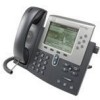Cisco 7962G Administration Guide - Page 89
Device > Phone >, Phone Configuration, Table 4-14, Network Configuration Menu Options
 |
UPC - 882658140341
View all Cisco 7962G manuals
Add to My Manuals
Save this manual to your list of manuals |
Page 89 highlights
Chapter 4 Configuring Settings on the Cisco Unified IP Phone Device Configuration Menu Related Topics • Displaying a Configuration Menu, page 4-2 • Network Configuration Menu, page 4-5 Network Configuration Menu The Network Configuration menu displays device-specific network configuration settings on the phone. Table 4-14 describes the options in this menu. Note The phone also has a Network Configuration menu that you access directly from the Settings menu. For information about the options on that menu, see the "Network Configuration Menu" section on page 4-5. Table 4-14 Network Configuration Menu Options Option Description To Change Load Server Used to optimize installation time for phone firmware upgrades and offload the WAN by storing images locally, negating the need to traverse the WAN link for each phone's upgrade. From Cisco Unified Communications Manager Administration, choose Device > Phone > Phone Configuration. You can set the Load Server to another TFTP server IP address or name (other than the TFTP Server 1 or TFTP Server 2) from which the phone firmware can be retrieved for phone upgrades. When the Load Server option is set, the phone contacts the designated server for the firmware upgrade. Note The Load Server option allows you to specify an alternate TFTP server for phone upgrades only. The phone continues to use TFTP Server 1 or TFTP Server 2 to obtain configuration files. The Load Server option does not provide management of the process and of the files, such as file transfer, compression, or deletion. RTP Control Protocol Indicates whether the phone supports the Real-Time Control Protocol (RTCP). Settings include: From Cisco Unified Communications Manager Administration, choose Device > Phone > Phone Configuration. • Enabled • Disabled-default If this feature is disabled, several call statistic values display as 0. For additional information, see the following sections: • Call Statistics Screen, page 7-12 • Streaming Statistics, page 8-11 OL-14625-01 Cisco Unified IP Phone 7962G and 7942G Administration Guide for Cisco Unified Communications Manager 6.1 4-23















